 |
|
  03.20.03 03.20.03
click to enlarge






Suicide in Japan is something that has always
fascinated the West. As far as I know, the
Japanese are the only culture to have distilled
suicide down into a ritual art: variously
known as seppuku or harakiri.
When thinking about Japanese suicide, a lot
of mixed images come to mind. Some people
think of the stone-faced Samurai, shamed
by some wrong doing or other, slowly kneeling
down to the floor, drawing his short sword
from its scabbard, and disemboweling himself
with one sudden inward stab. Others think
of the kamikaze pilots who crashed their planes into American battleships
near the end of WWII. I always think about
the 100's of soldiers and officers that were
found dead in the underground bunkers of
Okinawa after it finally fell to the Allies.
What made my mind turn to Japanese suicides
was an article that I read in the Japan Times the other day entitled, "'Suicide economy'
thinning Japan's ranks" (which isn't
online). It presented a lot of startling
facts. It seems that the suicide rate is
rising in proportion to the worsening of
the economy, and that this is now becoming a political issue.
The highest rate of growth is among men in
their 40's and 50's, i.e., those most financially
and emotionally damaged by job loss. Take
for instance the man who tore his own head off by driving away in his car after tying one
end of a rope around his neck and the other
end around a tree.
Apparently, 600 Japanese kill themselves
each week, and it's starting to be recognized
as a crisis. Last year was the fifth in a
row that saw more than 30,000 Japanese kill
themselves. The suicide rate here is double
that of the U.S. and triple that of the U.K.
Of course, a lot of young people kill themselves
too. Every year there are stories of kids jumping off of high school roofs because
of bullying, and cases of over stressed college
applicants killing themselves after failing
entrance exams. Recently, there have been
several cases of young people making pacts over the Internet and then getting together to off themselves en masse.
One of my favourite Japanese suicide fun
facts is the infamous Aokigahara forest, also known as 'suicide forest'. Located
at the foot of Mt. Fuji, it's a favourite
place for people to go and hang themselves.
Every year the forest is combed by teams
of volunteers who collect the bodies. Last
year they found 73 bodies and caught and
detained 83 people planning to kill themselves.
I don't really know why so many people are
killing themselves in Japan. A lot of people
think that it's a cultural disposition, but
who's to really say. I'm just pointing out
a few interesting observations. You'll have
to make up your own mind about the issue.
  03.17.03 03.17.03
click to enlarge



Tomorrow I will write the final exam for
my Japanese course. If I pass it I can move
up to the next level and continue to study
for another semester.
This means that I don't have much time right
now for Hunkabutta. However, after this week
I have a two-week break from school and I
should be able to post a lot of new stuff.
Gotta run and study. See you in a couple
of days.
  03.14.03 03.14.03
click to enlarge
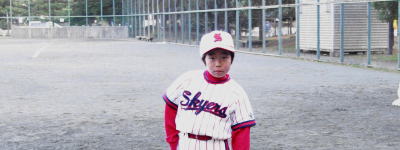

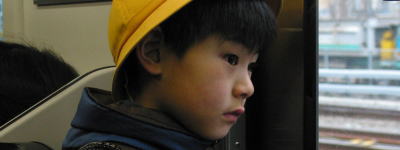


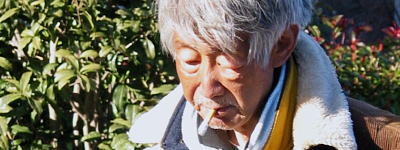
I don't usually like to talk about politics
and world events on Hunkabutta because I
feel that people get enough of that stuff
elsewhere, and it's not really why they come
to visit Hunkabutta anyway.
However, I can't help but mention that in
the comments from my last post a reader,
UltraBob, told us about a blog coming from Iraq that
links to Hunkabutta: Where is Raed?. I read it and squirmed in my chair. I felt
unsettled reading a blog coming from a place
we're about to drop bombs on. I bet you'll
feel the same way when you read it.
Where is Raed?, and other victim-nation blogs like it,
will probably do more to sway the sentiment
of the American public away from war than
all of the impassioned intellectual essays
out there combined.
Why does it make us feel so strange? Why
is this blog significant?
It humanizes the enemy. Personal blogs are
inherently intimate, that's their appeal.
They give the reader insight into the individual
by the way that they present the minor details
of a person's life.
Also, it's a 'place blog', just like Hunkabutta
or Ziboy. It's a point of contact between the vague
pseudo-reality of the Internet and a concrete
geographical place. In that sense, it tries
to make the reader/viewer familiar with a
place by presenting it through the personal
experience of an individual. This is the
opposite of an academic approach to the study
of a region which is ideally objective, generalized,
and abstracted.
Finally, Where is Raed? is an example of a new form of news. It's
news that is coming directly from the news
topic itself, not from any kind of reporter
external to the events. Actually, it's not
really 'news' per se, it's the 'context'
within which news is occurring. This context
is what is usually missing from traditional
(i.e., normal, everyday) news.
There's been talk of the Internet democratizing
news media, but this usually focuses on the
idea that 'anyone can publish' on the Internet:
Independent reporters, maybe just Joe-average
witnesses to newsworthy events, can deliver
unbiased news. However, news from the news
topic itself takes this to a whole new level.
The difference is like reading a report about
a car crash written by the person driving
the car, versus one written by an independent/unbiased
witness, versus one written by a staff writer
for a major daily newspaper.
The Western world has obviously become averse
to large-scale causalities in its armed forces.
Every successive war seems to result in fewer
and fewer allied deaths to the point where
(like in Afghanistan) we're killing more
of our own forces through accidents than
the enemy is through combat. We also seem
to be getting more averse to enemy civilian
causalities. I know, civilian deaths are
still the norm, but at least nowadays it's
an issue of contention rather than an insignificant
fact (like in Vietnam) or a goal in itself
(like in WWII).
Maybe the Internet and blogs, or some future
mutation of the blog, will further this humanitarian
trend in public sentiment. Maybe if people
were blogging from their villages in Vietnam
we would have ended that sad war earlier
than we did.
I guess we'll have to wait and see.
  03.11.03 03.11.03
click to enlarge
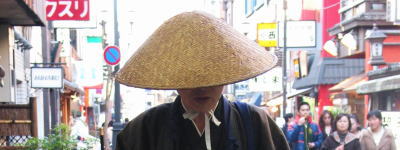

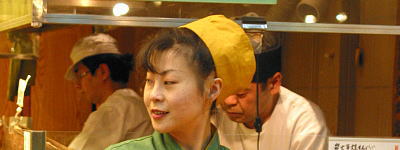
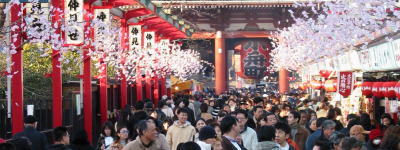
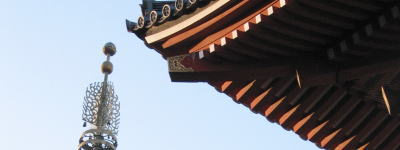


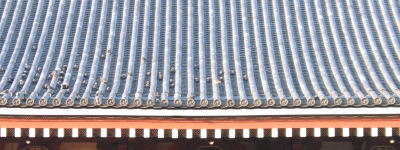
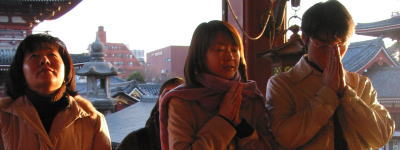
My father-in-law Gary returned to Canada
today. We'll miss his inquisitive approach
to life in Japan and his habitual smile...
and also the free baby sitting.
I think that he had a good time here, although
we didn't get to take him out as much as
we had wanted. Things are pretty hectic at
the moment.
Today's pictures were taken on one of our
day trips with Gary when we all went to Senso-ji temple in Asakusa.
Gotta go now, so enjoy the pictures...
|
|
|
 |


32 comments so far